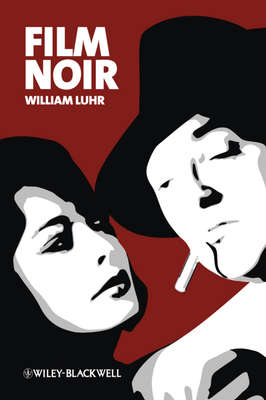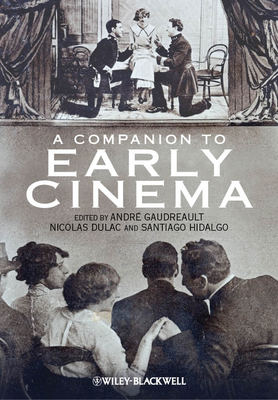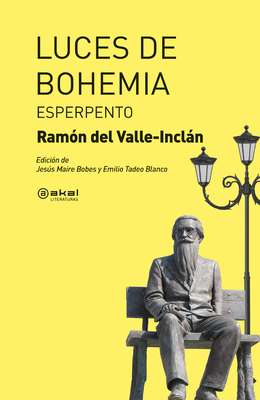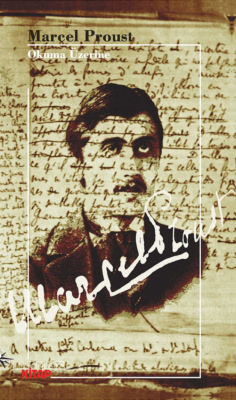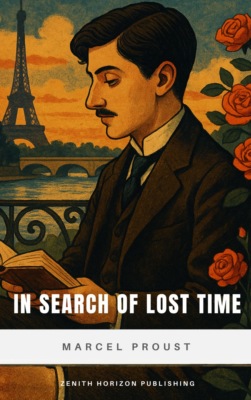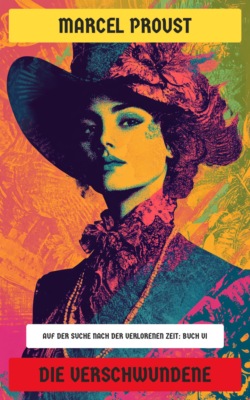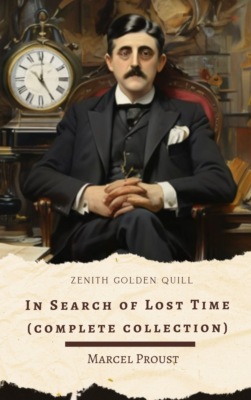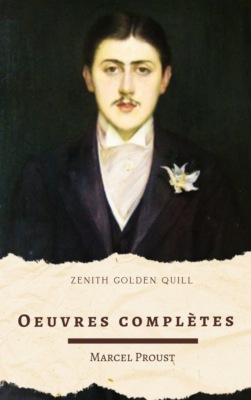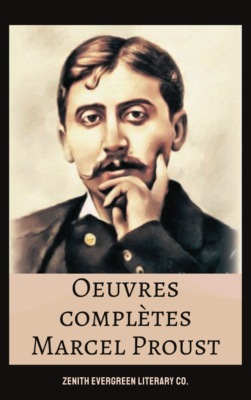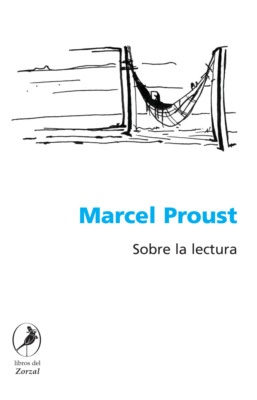Kitabı oku: «In Search Of Lost Time. Volumes 1 to 7», sayfa 44
Within the next few days, in spite of the reluctance that Albertine had shewn from introducing me to them, I knew all the little band of that first afternoon (except Gisèle, whom, owing to a prolonged delay at the level crossing by the station and a change in the time-table, I had not succeeded in meeting on the train, which had been gone some minutes before I arrived, and to whom as it happened I never gave another thought), and two or three other girls as well to whom at my request they introduced me. And thus, my expectation of the pleasure which I should find in a new girl springing from another girl through whom I had come to know her, the latest was like one of those new varieties of rose which gardeners get by using first a rose of another kind. And as I passed from blossom to blossom along this flowery chain, the pleasure of knowing one that was different would send me back to her to whom I was indebted for it, with a gratitude in which desire was mingled fully as much as in my new expectation. Presently I was spending all my time among these girls.
Alas! in the freshest flower it is possible to discern those just perceptible signs which to the instructed mind indicate already what will be, by the desiccation or fructification of the flesh that is to-day in bloom, the ultimate form, immutable and already predestinate, of the autumnal seed. The eye rapturously follows a nose like a wavelet that deliriously curls the water’s face at daybreak and seems not to move, to be capturable by the pencil, because the sea is so calm then that one does not notice its tidal flow. Human faces seem not to change while we are looking at them, because the revolution which they perform is too slow for us to perceive it. But we have only to see, by the side of any of those girls, her mother or her aunt, to realise the distance over which, obeying the gravitation of a type that is, generally speaking, deplorable, her features will have travelled in less than thirty years, and must continue to travel until the sunset hour, until her face, having vanished altogether below the horizon, catches the light no more. I knew that, as deep, as ineluctable as is their Jewish patriotism or Christian atavism in those who imagine themselves to be the most emancipated of their race, there dwelt beneath the rosy inflorescence of Albertine, Rosemonde, Andrée, unknown to themselves, held in reserve until the circumstances should arise, a coarse nose, a protruding jaw, a bust that would create a sensation when it appeared, but was actually in the wings, ready to “come on,” just as it might be a burst of Dreyfusism, or clericalism, sudden, unforeseen, fatal, some patriotic, some feudal form of heroism emerging suddenly when the circumstances demand it from a nature anterior to that of the man himself, by means of which he thinks, lives, evolves, gains strength himself or dies, without ever being able to distinguish that nature from the successive phases which in turn he takes for it. Even mentally, we depend a great deal more than we think upon natural laws, and our mind possesses already, like some cryptogamous plant, every little peculiarity that we imagine ourselves to be selecting. For we can see only the derived ideas, without detecting the primary cause (Jewish blood, French birth or whatever it may be) that inevitably produced them, and which at a given moment we expose. And perhaps, while the former appear to us to be the result of deliberate thought, the latter that of an imprudent disregard for our own health, we take from our family, as the papilionaceae take the form of their seed, as well the ideas by which we live as the malady from which we shall die.
As on a plant whose flowers open at different seasons, I had seen, expressed in the form of old ladies, on this Balbec shore, those shrivelled seed-pods, those flabby tubers which my friends would one day be. But what matter? For the moment it was their flowering-time. And so when Mme. de Villeparisis asked me to drive with her I sought an excuse to be prevented. I never went to see Elstir unless accompanied by my new friends. I could not even spare an afternoon to go to Doncières, to pay the visit I had promised Saint-Loup. Social engagements, serious discussions, even a friendly conversation, had they usurped the place allotted to my walks with these girls, would have had the same effect on me as if, when the luncheon bell rang, I had been taken not to a table spread with food but to turn the pages of an album. The men, the youths, the women, old or mature, whose society we suppose that we shall enjoy, are borne by us only on an unsubstantial plane surface, because we are conscious of them only by visual perception restricted to its own limits; whereas it is as delegates from our other senses that our eyes dart towards young girls; the senses follow, one after another, in search of the various charms, fragrant, tactile, savoury, which they thus enjoy even without the aid of fingers and lips; and able, thanks to the art of transposition, the genius for synthesis in which desire excels, to reconstruct beneath the hue of cheeks or bosom the feel, the taste, the contact that is forbidden them, they give to these girls the same honeyed consistency as they create when they stand rifling the sweets of a rose-garden, or before a vine whose clusters their eyes alone devour.
If it rained, although the weather had no power to daunt Albertine, who was often to be seen in her waterproof spinning on her bicycle through the driving showers, we would spend the day in the Casino, where on such days it would have seemed to me impossible not to go. I had the greatest contempt for the young Ambresacs, who had never set foot in it. And I willingly joined my friends in playing tricks on the dancing master. As a rule we had to listen to admonition from the manager, or from some of his staff, usurping dictatorial powers, because my friends, even Andrée herself, whom on that account I had regarded when I first saw her as so dionysiac a creature, whereas in reality she was delicate, intellectual, and this year far from well, in spite of which her actions were controlled less by the state of her health than by the spirit of that age which overcomes every other consideration and confounds in a general gaiety the weak with the strong, could not enter the outer hall of the rooms without starting to run, jumping over all the chairs, sliding back along the floor, their balance maintained by a graceful poise of their outstretched arms, singing the while, mingling all the arts, in that first bloom of youth, in the manner of those poets of ancient days for whom the different ‘kinds’ were not yet separate, so that in an epic poem they would introduce rules of agriculture with theological doctrine.
This Andrée who had struck me when I first saw them as the coldest of them all, was infinitely more refined, more loving, more sensitive than Albertine, to whom she displayed the caressing, gentle affection of an elder sister. At the Casino she would come across the floor to sit down by me, and knew instinctively, unlike Albertine, to refuse my invitation to dance, or even, if I was tired, to give up the Casino and come to me instead at the hotel. She expressed her friendship for me, for Albertine, in terms which were evidence of the most exquisite understanding of the things of the heart, which may have been partly due to the state of her health. She had always a merry smile of excuse for the childish behaviour of Albertine, who expressed with a crude violence the irresistible temptation held out to her by the parties and picnics to which she had not the sense, like Andrée, resolutely to prefer staying and talking with me. When the time came for her to go off to a luncheon party at the golf-club, if we were all three together she would get ready to leave us, then, coming up to Andrée: “Well, Andrée, what are you waiting for now? You know we are lunching at the golf-club.” “No; I’m going to stay and talk to him,” replied Andrée, pointing to me. “But you know, Mme. Durieux invited you,” cried Albertine, as if Andree’s intention to remain with me could be explained only by ignorance on her part where else and by whom she had been bidden. “Look here, my good girl, don’t be such an idiot,” Andrée chid her. Albertine did not insist, fearing a suggestion that she too should stay with me. She tossed her head. “Just as you like,” was her answer, uttered in the tone one uses to an invalid whose self-indulgence is killing him by inches, “I must fly; I’m sure your watch is slow,” and off she went. “She is a dear girl, but quite impossible,” said Andrée, bathing her friend in a smile at once caressing and critical. If in this craze for amusement Albertine might be said to echo something of the old original Gilberte, that is because a certain similarity exists, although the type evolves, between all the women we love, a similarity that is due to the fixity of our own temperament, which it is that chooses them, eliminating all those who would not be at once our opposite and our complement, fitted that is to say to gratify our senses and to wring our heart. They are, these women, a product of our temperament, an image inversely projected, a negative of our sensibility. So that a novelist might, in relating the life of his hero, describe his successive love-affairs in almost exactly similar terms, and thereby give the impression not that he was repeating himself but that he was creating, since an artificial novelty is never so effective as a repetition that manages to suggest a fresh truth. He ought, moreover, to indicate in the character of the lover a variability which becomes apparent as the story moves into fresh regions, into different latitudes of life. And perhaps he would be stating yet another truth if while investing all the other persons of his story with distinct characters he refrained from giving any to the beloved. We understand the characters of people who do not interest us; how can we ever grasp that of a person who is an intimate part of our existence, whom after a little we no longer distinguish in any way from ourselves, whose motives provide us with an inexhaustible supply of anxious hypotheses which we perpetually reconstruct. Springing from somewhere beyond our understanding, our curiosity as to the woman whom we love overleaps the bounds of that woman’s character, which we might if we chose but probably will not choose to stop and examine. The object of our uneasy investigation is something more essential than those details of character comparable to the tiny particles of epidermis whose varied combinations form the florid originality of human flesh. Our intuitive radiography pierces them, and the images which it photographs for us, so far from being those of any single face, present rather the joyless universality of a skeleton.
Andrée, being herself extremely rich while the other was penniless and an orphan, with real generosity lavished on Albertine the full benefit of her wealth. As for her feelings towards Gisèle, they were not quite what I had been led to suppose. News soon reached us of the young student, and when Albertine handed round the letter she had received, a letter intended by Gisèle to give an account of her journey and to report her safe arrival to the little band, pleading laziness as an excuse for not having written yet to the rest, I was surprised to hear Andrée (for I imagined an irreparable breach between them) say: “I shall write to her to-morrow, because if I wait for her to write I may have to wait for years, she’s such a slacker.” And, turning to myself, she added: “You saw nothing much in her, evidently; but she’s a jolly nice girl, and besides I’m really very fond of her.” From which I concluded that Andrée’s quarrels were apt not to last very long.
Except on these rainy days, as we had always arranged to go on our bicycles along the cliffs, or on an excursion inland, an hour or so before it was time to start I would go upstairs to make myself smart and would complain if Françoise had not laid out all the things that I wanted. Now even in Paris she would proudly, angrily straighten a back which the years had begun to bend, at the first word of reproach, she so humble, she so modest and charming when her self-esteem was flattered. As this was the mainspring of her life: her satisfaction, her good humour were in direct ratio to the difficulty of the tasks imposed on her. Those which she had to perform at Balbec were so easy that she shewed almost all the time a discontent which was suddenly multiplied an hundredfold, with the addition of an ironic air of offended dignity when I complained, on my way down to join my friends, that my hat had not been brushed or my ties sorted. She who was capable of taking such endless pains, without in consequence assuming that she had done anything at all, on my simply remarking that a coat was not in its proper place, not only did she boast of the care with which she had “put it past sooner than let it go gathering the dust,” but, paying a formal tribute to her own labours, lamented that it was little enough of a holiday that she was getting at Balbec, and that we would not find another person in the whole world who would consent to put up with such treatment. “I can’t think how anyone can leave things lying about the way you do; you just try and get anyone else to find what you want in such a mix-up. The devil himself would give it up as a bad job.” Or else she would adopt a regal mien, scorching me with her fiery glance, and preserve a silence that was broken as soon as she had fastened the door behind her and was outside in the passage, which would then reverberate with utterances which I guessed to be insulting, though they remained as indistinct as those of characters in a play whose opening lines are spoken in the wings, before they appear on the stage. And even if nothing was missing and Françoise was in a good temper, still she made herself quite intolerable when I was getting ready to go out with my friends. For, drawing upon a store of stale witticisms at their expense which, in my need to be talking about the girls, I had made in her hearing, she put on an air of being about to reveal to me things of which I should have known more than she had there been any truth in her statements, which there never was, Françoise having misunderstood what she had heard. She had, like most people, her own ways; a person is never like a straight highway, but surprises us with the strange, unavoidable windings of his course through life, by which, though some people may not notice them, we find it a perpetual annoyance to be stopped and hindered. Whenever I arrived at the stage of “Where is my hat?” or uttered the name of Andrée or Albertine, I was forced by Françoise to stray into endless and absurd side-tracks which greatly delayed my progress. So too when I asked her to cut me the sandwiches of cheese or salad, or sent her out for the cakes which I was to eat while we rested on the cliffs, sharing them with the girls, and which the girls “might very well have taken turns to provide, if they had not been so close,” declared Françoise, to whose aid there came at such moments a whole heritage of atavistic peasant rapacity and coarseness, and for whom one would have said that the soul of her late enemy Eulalie had been broken into fragments and reincarnate, more attractively than it had ever been in Saint-Eloi’s, in the charming bodies of my friends of the little band. I listened to these accusations with a dull fury at finding myself brought to a standstill at one of those places beyond which the well-trodden country path that was Françoise’s character became impassable, though fortunately never for very long. Then, my hat or coat found and the sandwiches ready, I sailed out to find Albertine, Andrée, Rosemonde, and any others there might be, and on foot or on our bicycles we would start.
In the old days I should have preferred our excursion to be made in bad weather. For then I still looked to find in Balbec the ‘Cimmerians’ land,’ and fine days were a thing that had no right to exist there, an intrusion of the vulgar summer of seaside holiday-makers into that ancient region swathed in eternal mist. But now, everything that I had hitherto despised, shut out of my field of vision, not only effects of sunlight upon sea and shore, but even the regattas, the race-meetings, I would have sought out with ardour, for the reason for which formerly I had wanted only stormy seas, which was that these were now associated in my mind, as the others had been, with an aesthetic idea. Because I had gone several times with my new friends to visit Elstir, and, on the days when the girls were there, what he had selected to shew us were drawings of pretty women in yachting dress, or else a sketch made on a race-course near Balbec. I had at first shyly admitted to Elstir that I had not felt inclined to go to the meetings that were being held there. “You were wrong,” he told me, “it is such a pretty sight, and so well worth seeing. For one thing, that peculiar animal, the jockey, on whom so many eager eyes are fastened, who in the paddock there looks so grim, a colourless face between his brilliant jacket and cap, one body and soul with the prancing horse he rides, how interesting to analyse his professional movements, the bright splash of colour he makes, with the horse’s coat blending in it, as they stream down the course. What a transformation of every visible object in that luminous vastness of a racecourse where one is constantly surprised by fresh lights and shades which one sees only there. How charming the women can look there, too! The first day’s racing was quite delightful, and there were women there exquisitely dressed, in the misty light of a Dutch landscape, in which one could feel rising to cloud the sun itself the penetrating coldness of the water. Never have I seen women arriving in carriages, or standing with glasses to their eyes in so extraordinary a light, which was due, I suppose, to the moisture from the sea. I should simply have loved to paint it. I came home from the races quite mad, and so keen to get to work! “After which he became more enthusiastic still over the yacht-races, and I realised that regattas, social fixtures where well-dressed women might be seen bathed in the greenish light of a marine race-course, might be for a modern artist as interesting a subject as were the revels which they so loved to depict for a Veronese or Carpaccio. When I suggested this to Elstir, “Your comparison is all the more true,” he replied, “since, from the position of the city in which they painted, those revels were to a great extent aquatic. Except that the beauty of the shipping in those days lay as a rule in its solidity, in the complication of its structure. They had water-tournaments, as we have here, held generally in honour of some Embassy, such as Carpaccio shews us in his Legend of Saint Ursula. The vessels were massive, built up like architecture, and seemed almost amphibious, like lesser Venices set in the heart of the greater, when, moored to the banks by hanging stages decked with crimson satin and Persian carpets, they bore their freight of ladies in cherry-red brocade and green damask close under the balconies incrusted with many-coloured marbles from which other ladies leaned to gaze at them, in gowns with black sleeves slashed with white, stitched with pearls or bordered with lace. You cannot tell where the land ends and the water begins, what is still the palace or already the vessel, the caravel, the galeas, the Bucintoro.” Albertine had listened with the keenest interest to these details of costume, these visions of elegance that Elstir was describing to us. “Oh, I should so like to see that lace you speak of; it’s so pretty, the Venice-point,” she cried. “Besides, I should love to see Venice.” “You may, perhaps, before very long, be able,” Elstir informed her, “to gaze upon the marvellous stuffs which they used to wear. Hitherto one has seen them only in the works of the Venetian painters, or very rarely among the treasures of old churches, except now and then when a specimen has come into the sale-room. But I hear that a Venetian artist, called Fortuny, has recovered the secret of the craft, and that before many years have passed women will be able to walk abroad, and better still to sit at home in brocades as sumptuous as those that Venice adorned, for her patrician daughters, with patterns brought from the Orient. But I don’t know that I should much care for that, that it wouldn’t be too much of an anachronism for the women of to-day, even when they parade at regattas, for, to return to our modern pleasure-craft, the times have completely changed since ‘Venice, Queen of the Adriatic.’ The great charm of a yacht, of the furnishings of a yacht, of yachting dress, is their simplicity, as just things for the sea, and I do so love the sea. I must confess to you that I prefer the fashions of to-day to those of Veronese’s and even of Carpaccio’s time. What there is so attractive about our yachts—and the smaller yachts especially, I don’t like the huge ones, they’re too much like ships; yachts are like women’s hats, you must keep within certain limits—is the unbroken surface, simple, gleaming, grey, which under a cloudy, leaden sky takes on a creamy softness. The cabin in which we live ought to make us think of a little café. And women’s clothes on board a yacht are the same sort of thing; what really are charming are those light garments, uniformly white, of cloth or linen or nankeen or drill, which in the sunlight and against the blue of the sea shew up with as dazzling a whiteness as a spread sail. You very seldom see a woman, for that matter, who knows how to dress, and yet some of them are quite wonderful. At the races, Mlle. Léa had a little white hat and a little white sunshade, simply enchanting. I don’t know what I wouldn’t give for that little sunshade.” I should have liked very much to know in what respect this little sunshade differed from any other, and for other reasons, reasons of feminine vanity, Albertine was still more curious. But, just as Françoise used to explain the excellence of her soufflés by “It’s the way you do them,” so here the difference lay in the cut. “It was,” Elstir explained, “quite tiny, quite round, like a Chinese umbrella.” I mentioned the sunshades carried by various ladies, but it was not like any of them. Elstir found them all quite hideous. A man of exquisite taste, singularly hard to please, he would isolate some minute detail which was the whole difference between what was worn by three-quarters of the women he saw, and horrified him, and a thing which enchanted him by its prettiness; and—in contrast to its effect on myself, whose mind any display of luxury at once sterilised—stimulated his desire to paint “so as to make something as attractive.” “Here you see a young lady who has guessed what the hat and sunshade were like,” he said to me, pointing to Albertine whose eyes shone with envy. “How I should love to be rich, to have a yacht!” she said to the painter. “I should come to you to tell me how to run it. What lovely trips I’d take. And what fun it would be to go to Cowes for the races. And a motor-car! Tell me, do you think the ladies’ fashions for motoring pretty?” “No”; replied Elstir, “but that will come in time. You see, there are very few firms at present, one or two only, Callot—although they go in rather too freely for lace—Doucet, Cheruit, Paquin sometimes. The others are all horrible.” “Then, is there a vast difference between a Callot dress and one from any ordinary shop?” I asked Albertine. “Why, an enormous difference, my little man! I beg your pardon! Only, alas! what you get for three hundred francs in an ordinary shop will cost two thousand there. But there can be no comparison; they look the same only to people who know nothing at all about it.” “Quite so,” put in Elstir; “though I should not go so far as to say that it is as profound as the difference between a statue from Rheims Cathedral and one from Saint-Augustin. By the way, talking of cathedrals,” he went on, addressing himself exclusively to me, because what he was saying had reference to an earlier conversation in which the girls had not taken part, and which for that matter would not have interested them at all, “I spoke to you the other day of Balbec Church as a great cliff, a huge breakwater built of the stone of the country; now look at this”; he handed me a water-colour. “Look at these cliffs (it’s a sketch I did close to here, at the Creuniers); don’t these rocks remind you of a cathedral?” And indeed one would have taken them for soaring red arches. But, painted on a roasting hot day, they seemed to have crumbled into dust, made volatile by the heat which had drunk up half the sea, distilled over the whole surface of the picture almost into a gaseous state. On this day on which the sunlight had, so to speak, destroyed reality, reality concentrated itself in certain dusky and transparent creatures which, by contrast, gave a more striking, a closer impression of life: the shadows. Ravening after coolness, most of them, deserting the scorched open spaces, had fled for shelter to the foot of the rocks, out of reach of the sun; others, swimming gently upon the tide, like dolphins, kept close under the sides of the moving vessels, whose hulls they extended upon the pale surface of the water with their glossy blue forms. It was perhaps the thirst for coolness which they conveyed that did most to give me the sensation of the heat of this day and made me exclaim how much I regretted not knowing the Creuniers. Albertine and Andrée were positive that I must have been there hundreds of times. If so I had been there without knowing it, never suspecting that one day the sight of these rocks was to inspire me with such a thirst for beauty, not perhaps exactly natural beauty such as I had been seeking hitherto among the cliffs of Balbec, but rather architectural. Above all, I who, having come here to visit the kingdom of the storm, had never found, on any of my drives with Mme. de Villeparisis, when often we saw it only from afar, painted in a gap between the trees, the ocean sufficiently real, sufficiently liquid, giving a sufficient impression that it was hurling its massed forces against the shore, and would have liked to see it lie motionless only under a wintry shroud of fog, I could never have believed that I should now be dreaming of a sea which was nothing more than a whitish vapour that had lost both consistency and colour. But of such a sea Elstir, like the people who sat musing on board those vessels drowsy with the heat, had so intensely felt the enchantment that he had succeeded in transcribing, in fixing for all time upon the painted sheet the imperceptible reflux of the tide, the throb of one happy moment; and one suddenly became so enamoured, at the sight of this magic portrait, that one could think of nothing else than to range the world over, seeking to recapture the vanished day in its instantaneous, slumbering beauty.
So that if before these visits to Elstir, before I had set eyes on one of his sea-pictures in which a young woman in a dress of white serge or linen, on the deck of a yacht flying the American flag, had duplicated a white linen dress and coloured flag in my imagination which at once bred in me an insatiable desire to visit the spot and see there with my own eyes white linen dresses and flags against the sea, as though no such experience had ever yet befallen me, always until then I had taken care when I stood by the sea to expel from my field of vision, as well as the bathers in the foreground, the yachts with their too dazzling sails that were like seaside costumes, everything that prevented me from persuading myself that I was contemplating the immemorial flood of ocean which had been moving with the same mysterious life before the appearance of the human race; and had grudged even the days of radiant sunshine which seemed to me to invest with the trivial aspect of the world’s universal summer this coast of fog and tempest, to mark simply an interruption, equivalent to what in music is known as a rest; now on the other hand it was the bad days that appeared to me to be some disastrous accident, a thing that could no longer find any place for itself in the world of beauty; I felt a keen desire to go out and recapture in reality what had so powerfully aroused my imagination, and I hoped that the weather would be propitious enough for me to see from the summit of the cliff the same blue shadows as were in Elstir’s picture.
Nor, as I went along, did I still make a frame about my eyes with my hands as in the days when, conceiving nature to be animated by a life anterior to the first appearance of man, and inconsistent with all those wearisome perfections of industrial achievement which had hitherto made me yawn with boredom at Universal Exhibitions or in the milliners’ windows, I endeavoured to include only that section of the sea over which there was no steamer passing, so that I might picture it to myself as immemorial, still contemporary with the ages in which it had been set apart from the land, or at least with the first dawn of life in Greece, which enabled me to repeat in their literal meaning the lines of ‘Father Leconte’ of which Bloch was so fond:
‘Gone are the Kings, gone are their towering prows,
Vanished upon the raging deep, alas,
The long-haired warrior heroes of Hellas.’
I could no longer despise the milliners, now that Elstir had told me that the delicate touches by which they give a last refinement, a supreme caress to the ribbons or feathers of a hat after it is finished, would be as interesting to him to paint as the muscular action of the jockeys themselves (a statement which had delighted Albertine). But I must wait until I had returned—for milliners, to Paris—for regattas and races to Balbec, where there would be no more now until next year. Even a yacht with women in white linen garments was not to be found.



